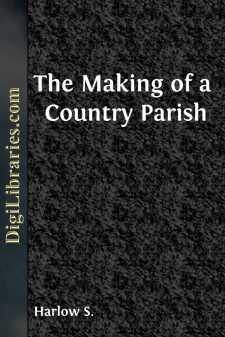Categories
- Antiques & Collectibles 13
- Architecture 36
- Art 48
- Bibles 22
- Biography & Autobiography 813
- Body, Mind & Spirit 142
- Business & Economics 28
- Children's Books 16
- Children's Fiction 13
- Computers 4
- Cooking 94
- Crafts & Hobbies 4
- Drama 346
- Education 46
- Family & Relationships 57
- Fiction 11829
- Games 19
- Gardening 17
- Health & Fitness 34
- History 1377
- House & Home 1
- Humor 147
- Juvenile Fiction 1873
- Juvenile Nonfiction 202
- Language Arts & Disciplines 88
- Law 16
- Literary Collections 686
- Literary Criticism 179
- Mathematics 13
- Medical 41
- Music 40
- Nature 179
- Non-Classifiable 1768
- Performing Arts 7
- Periodicals 1453
- Philosophy 64
- Photography 2
- Poetry 896
- Political Science 203
- Psychology 42
- Reference 154
- Religion 513
- Science 126
- Self-Help 84
- Social Science 81
- Sports & Recreation 34
- Study Aids 3
- Technology & Engineering 59
- Transportation 23
- Travel 463
- True Crime 29
The Making of a Country Parish
by: Harlow S.
Description:
Excerpt
FOREWORD
For many years lovers of the republic have been warning our people as to the perils of modern city life. In 1800 one person out of thirteen lived in the city; to-day nearly every other citizen lives in a large town, or a great city. The city is the home of wealth, commerce, and finance; the home of music, art, and eloquence. Once each year all the great leaders come for a stay, long or short, to the metropolis. The birds leave the desert to seek the oasis, with its palm trees and springs of water. Young men, for two generations, have been deserting the farm and the village, to make their home in the great city. Many unexpected perils have sprung up from this massing of population. Among these dangers are the tenements, saloon, gambling houses, dens of vice, the tendency to anarchy, incident to the contrast between the palaces on the avenues and the rookeries on the Bowery. Insane people, defective children, men and women wrecked through drink and drugs, are some of the incidental results of congested populations. Innumerable addresses have been given upon the perils of the city life, and innumerable pamphlets and books have been published filled with warnings and black with alarm. The inevitable result is that the attention of the people has been focalized upon the manufacturing towns and the large cities.
Now comes the Rev. Harlow S. Mills, with his study of the rural population. With the wisdom made possible by twenty years of first-hand knowledge he sets forth the influence of the country upon the large town and city. He tells us that the country has furnished the leaders for the people. It is in the country that the boy has his opportunity of brooding and reading and reflecting, while in solitude he develops his own gift and grows great. The Church has learned to depend upon the country for its theological students, as well as for its best students of law and medicine. But of late the country church has suffered grievously through the pull of the city upon its best young men and women. The inevitable result has been that as the city church has waxed the country church has waned in wealth, numbers, and influence. Many things have occurred during the past twenty years that are calculated to stir the note of fear, lest the life and institutions of the republic, rooted in the country, should slowly starve. One of the problems of the hour has been the rejuvenation of the country Sunday-school and the country church.
Leaders of the past generation have struggled often in vain with this problem. Twenty years ago, the Rev. Harlow S. Mills, a friend of my boyhood, took a country church in northwestern Michigan, and started in to develop the same community spirit among the people who lived in widely separated school districts that the student finds developed in the wards of a great city. The story of these twenty years is full of fascination to all lovers of their fellow men and of the Christian Church. Mr. Mills has made some important discoveries and established certain mother principles that should be of invaluable service to the one half of our people living in small towns and rural districts....


